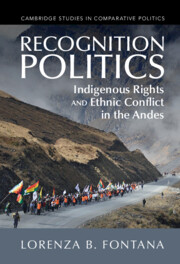Book contents
- Recognition Politics
- Cambridge Studies in Comparative Politics
- Recognition Politics
- Copyright page
- Dedication
- Contents
- Figures
- Tables
- Acknowledgements
- Acronyms and Abbreviations
- Introduction
- 1 Recognition Conflicts
- 2 Citizenship and Development in the Andes
- 3 Class and Ethnic Shifts
- 4 Recognition for Whom?
- 5 The Physical Boundaries of Identity
- 6 Unsettled Demographies
- 7 Struggles for Inclusion and Exclusion
- 8 Rethinking Recognition: What Are the Implications for Identity Governance?
- References
- Index
- Other Books in the Series (continued from page ii)
3 - Class and Ethnic Shifts
Published online by Cambridge University Press: 05 January 2023
- Recognition Politics
- Cambridge Studies in Comparative Politics
- Recognition Politics
- Copyright page
- Dedication
- Contents
- Figures
- Tables
- Acknowledgements
- Acronyms and Abbreviations
- Introduction
- 1 Recognition Conflicts
- 2 Citizenship and Development in the Andes
- 3 Class and Ethnic Shifts
- 4 Recognition for Whom?
- 5 The Physical Boundaries of Identity
- 6 Unsettled Demographies
- 7 Struggles for Inclusion and Exclusion
- 8 Rethinking Recognition: What Are the Implications for Identity Governance?
- References
- Index
- Other Books in the Series (continued from page ii)
Summary
In the previous chapter, I briefly illustrated the changes in citizenship and development models institutionalised by Latin American governments from the early twentieth century up to the present day. These transformations have shaped the very identities of social actors, and their modes of interaction with the state and between themselves. How have patterns of collective self-identification changed over time and how have scholars made sense of these processes? In this chapter, I focus on changes in collective identities through a critical assessment of the narratives used to describe the alternations between class and ethnicity as referents for social organisation. Indeed, as Yashar (2005) has famously demonstrated in the Latin American context, different kinds of citizenship regimes diffuse and then activate different identity cleavages. A review of the abundant literature on rural movements in Latin America clearly shows how scholarly production has been greatly influenced by intellectual fashions and political ideologies, often in a cyclical way. As a result, the same aspects of reality have been glorified in certain periods and neglected in others, and most narratives of social change have oscillated between either dichotomous or homogenising interpretations of collective identities. Here, I consciously try to remedy this imbalance as I analyse the political roles, forms of organisation and social relevance of both indigenous and peasant movements since the 1950s.
- Type
- Chapter
- Information
- Recognition PoliticsIndigenous Rights and Ethnic Conflict in the Andes, pp. 71 - 94Publisher: Cambridge University PressPrint publication year: 2023

